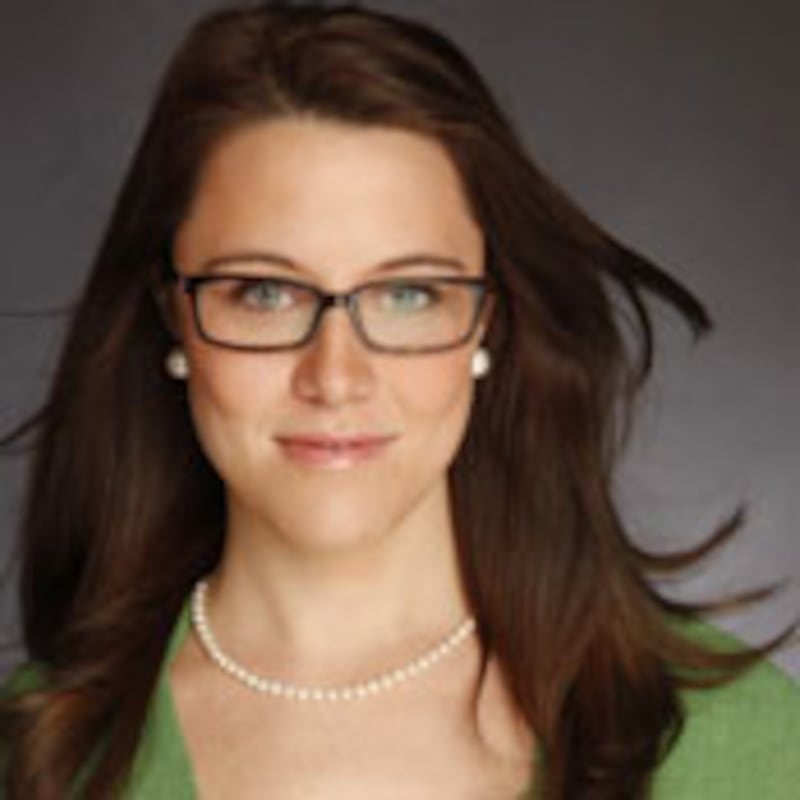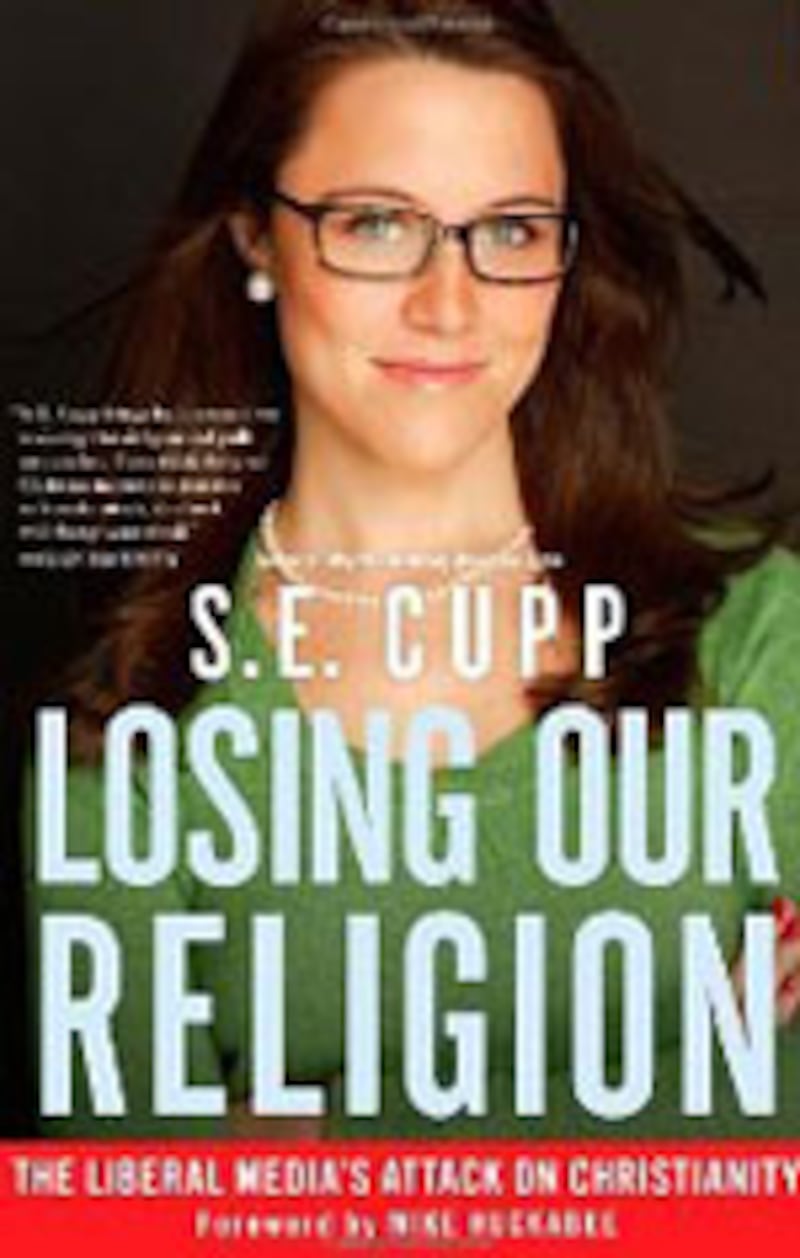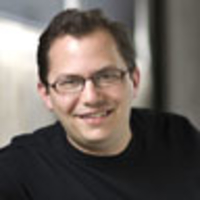
S.E. Cupp is the right wing’s current media darling who doesn’t believe in God but just penned a book attacking the liberal media and defending Christianity. Benyamin Cohen unravels the Cupp enigma.
“Newsweek is one of the most anti-Christian magazines out there.” That’s S.E. Cupp talking. We’ve barely just begun a phone interview and already the fiery gems are flying. “They have a genuine antipathy for Christianity,” she continues. “I don’t know what’s motivating them, but it’s hard to deny the evidence.”
It seems even being under the weather can’t keep her down and off-message. S.E. Cupp is, at the moment, nursing a cold. The 31-year-old Cornell grad is holed up in her Lower Manhattan apartment recuperating. Weeks of nonstop promotion for her new book—speeches, TV appearances, book signings—have taken their toll.
Newsweek’s alleged Jesus bias is just one of many topics covered in Cupp’s new book, Losing Our Religion: The Liberal Media’s Attack on Christianity. Targets include MSNBC, Katie Couric, NPR, and The New York Times just to name a few. She also takes aim at President Obama, calling him a “radical liberal… raised by atheists” who has an agenda with “socialist tenets.” With a foreword from Mike Huckabee, a glowing endorsement from Sean Hannity, and a regular spot as a pundit on Fox News, Cupp has become (perhaps unwittingly) the media darling of the right wing.
Which might go against type, considering she’s a Boston-bred Ivy League grad who just happens to also be an atheist. Yes, Sean Hannity’s newest crush is an atheist. (She likes to joke that he’s tried to baptize her at the Fox News water cooler.)
Raised a Roman Catholic, with a short pit stop in New Age Buddhism, she long ago left a life of faith. “I knew at a very young age that I didn’t really buy the whole God gamut,” she explains, a lilt of hoarseness in her voice. “I didn’t know why. I wouldn’t say it was rebellion. It was skepticism. It just didn’t add up to me.” This coming from a woman who wanted to be a nun when she grew up and just received a master’s degree in religious studies from New York University.
“I’m not someone else’s mouthpiece,” Cupp says. “I’m not carrying water for anyone—whether that’s the GOP, Fox News, or Christianity. I’m not doing anyone else’s dirty work.”
Yes, S.E. Cupp is an enigma, a study in contradictions.
She’s a fan favorite on Fox News and up until recently was also employed as a researcher for The New York Times. She’s a classically trained ballet dancer but also enjoys target shooting and loves NASCAR. (She spent an entire year following Tony Stewart from race to race and ended up being invited to his championship bash.)
To the untrained eye, she seems contrarian by nature. In a recent article in the New York Daily News, where Cupp has a weekly column, she took a counterintuitive stance suggesting that perhaps it might not be a good idea to clean up the oil spill in the Gulf, claiming it would be costly, ineffective, and may even cause more harm to the region.
Unwrapping her many layers has become the current parlor game of the media and blogosphere. Who is S.E. Cupp? What does she stand for? Is she with us or against us? Or, could it be, is she something entirely different?

Everyone, it appears, seems to be sculpting her in the image they best see fit. The right sees her, quite literally, as a godsend. Her passionate and well-researched book preaches to the choir of conservative Christians. At the same time, the left sees her as the boogeyman, albeit a much more attractive version of Rush Limbaugh. A wolf dressed in sheep’s clothing. “To be anyone's darling is to be someone else’s bull's eye,” she says. “Most of the time I'm shocked anyone’s interested.”
But for Cupp, both depictions are mere stereotypes, a yoke unwittingly thrust upon her by those who don’t really know her. “It’s annoying, actually,” she admits.
“I'm not someone else’s mouthpiece,” she says. “I’m not carrying water for anyone—whether that's the GOP, Fox News, or Christianity. I’m not doing anyone else’s dirty work, nor am I pretending to have any of the views I have in the interest of being provocative, or for ratings, stardom, or Twitter fans.” (For the record, she has 14,617 as of this writing.)
Indeed, Cupp would prefer if the narrative were not about her, but about the subject of her book. “I never have any idea how my opinions will be received, and more often than not I'm surprised when anything I say is controversial,” she admits. “I really believe that what I do is speak common sense to some of these overly politicized, heavily mediated issues.”
It’s that common sense that separates her from the rabid pack of Fox News punditry. Indeed, she views her book as an intellectual pursuit in media discourse. “For me, it was a media-criticism project and it was understandably marketed as a religious polemic,” she says with a hint of exasperation. “To be completely honest, my goal here was not to excite a particular religious community. My goal was to argue for a more responsible press. I take that job pretty seriously. I really wish we would all just be a little more respectful and work with a little more integrity.” And that, not religious zealotry, is the underlying thesis of her book.
She has taken her own advice, recently backtracking and apologizing to Rachel Maddow’s producers for misquoting the MSNBC host.
I ask Cupp if she thinks news editors start their meetings by asking, “How can we belittle Christianity today?” She seems surprised I would even pose such a hypothetical. “Nobody has to talk it about,” she replies. “Liberalism and secularism are the standards and anything that crops up against that are the exceptions. I don’t think they have to discuss it or organize it. It’s so ingrained, it works on its own.”
Mark Oppenheimer, who holds a Ph.D. in American religious history from Yale University where he is the coordinator of the Yale Journalism initiative, disagrees with Cupp’s assertion that there is a political liberalism in religion reporting. “Most of the stories we are called on to report are in the profane realm, not the sacred,” says Oppenheimer, who writes the “Beliefs” column for The New York Times. “After all, nobody calls us out to interview God; we're more likely to be interviewing ministers about a new church building or their plans for missionary outreach. How is there a ‘secular’ or ‘Christian’ way to report stuff like that? Isn't there just an honest, fair way to report it?”
But Cupp sees herself as a crusader for quality journalism, seeking a return (as so many conservative commentators do) to a simpler, more tranquil time. “There’s a job out there to be done for the religion beat reporter… I really wish we could go back to our journalistic roots, myself included. We’ve all become pundits these days.”
Regardless of what she believes about the non-vitriolic nature of her work and philosophy, Cupp’s rhetoric continues to cause controversy. Newsweek ’s religion editor, for example, has been a regular target for Cupp. “Lisa Miller continually uses her column to excoriate faith,” says Cupp. “Some of the editorial decisions that magazine has made in the past couple years make it unquestionable to me that they’re driving a secular agenda.”
Miller obviously sees things a bit differently. "Nothing could be further from the truth,” Miller told me in an email. “We have a great respect for religious faith and people of faith—as well as for nonbelievers. We cannot see how a close reader of our work could conclude otherwise." Indeed, Bill Maher used the same argument when he had Cupp on a recent episode of Real Time With Bill Maher, displaying dozens of Newsweek covers dedicated to Christian topics. (Maher, a fellow atheist, also roundly criticized Cupp for her views.)
As for Cupp, the latest rumor around the gossip mill is that she is pretending to be an atheist. Which she finds amusing, considering she’s trying to sell a book defending Christianity to Christians. “It’s fairly insulting, not to mention condescending. But I try to laugh it off.”
If anything, Cupp sees her book’s outreach to the Christian community as an exercise in interfaith relations. While defending a God she doesn’t believe in, she’s attempting to prove her own point: that beliefs shouldn’t interfere with reporting. The book has becomes an ode to her own “responsible journalism” philosophy.
It’s times like this, under the weather and under attack, when Cupp wonders what a faith-filled life would look like. “With God, you have a partner in life all the time regardless of the trials and tribulations. You have something that is constantly challenging you to be better,” she says. “I’ve always been envious of people who have had that connection and ability—to fully and wholly believe. It seems really great to be a person of faith. I think it sounds really comforting.” She pauses, as if to contemplate what she’s just revealed. “And I don’t mean that in a condescending way, but I mean that genuinely and sincerely.”
Plus: Check out Book Beast, for more news on hot titles and authors and excerpts from the latest books.
Benyamin Cohen is the author of My Jesus Year: A Rabbi’s Son Wanders the Bible Belt in Search of His Own Faith (HarperOne) and the content director for the Mother Nature Network. He can be found at www.myjesusyear.com.






